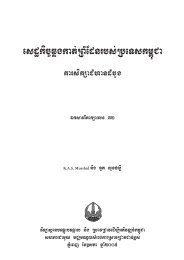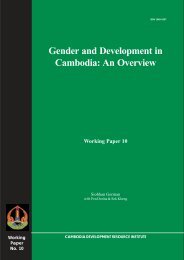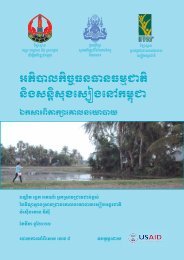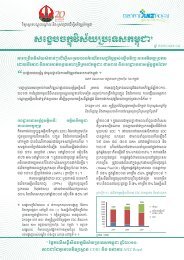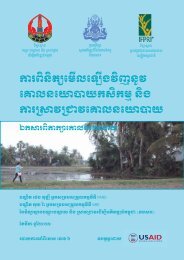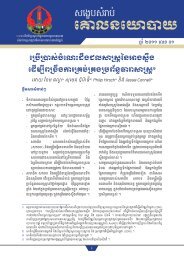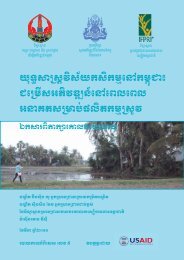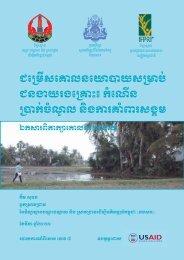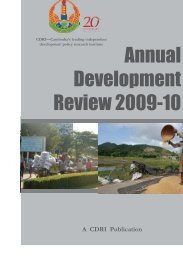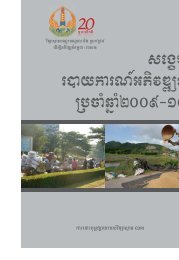62) decentralised governance of irrigation water in cambodia - CDRI
62) decentralised governance of irrigation water in cambodia - CDRI
62) decentralised governance of irrigation water in cambodia - CDRI
Create successful ePaper yourself
Turn your PDF publications into a flip-book with our unique Google optimized e-Paper software.
authorities, <strong>in</strong>fluenced no doubt by elements <strong>of</strong> Cambodian culture which may deem public<br />
compla<strong>in</strong>ts to be disrespectful. In DAP, farmer participation <strong>in</strong> decision-mak<strong>in</strong>g does not<br />
exist, and decisions seem to be made by PDOWRAM while the FWUC’s role is more one <strong>of</strong><br />
report<strong>in</strong>g upwards and wait<strong>in</strong>g for PDOWRAM’s <strong>in</strong>structions. This is <strong>in</strong> part attributed to the<br />
vastness <strong>of</strong> the scheme which puts it beyond the f<strong>in</strong>ancial and technical capacity <strong>of</strong> the FWUC.<br />
Also significant is that report<strong>in</strong>g upwards and wait<strong>in</strong>g for <strong>in</strong>struction is strongly embedded<br />
<strong>in</strong> the Cambodian culture, where it this perceived to be the right behaviour for lower and<br />
less powerful <strong>governance</strong> bodies with<strong>in</strong> the patron-client hierarchical <strong>governance</strong> system. In<br />
Rolous, farmers have hardly participated <strong>in</strong> the election <strong>of</strong> the FWUC association because they<br />
simply do not trust the election as a mechanism for select<strong>in</strong>g good and capable leaders who<br />
could solve their problems. Participation <strong>in</strong> terms <strong>of</strong> ISF contribution varies from case to case.<br />
F<strong>in</strong>d<strong>in</strong>gs from the three case-study schemes show some positive outcomes from enforc<strong>in</strong>g the<br />
ISF policy; however, the low economic status <strong>of</strong> many farmers complicates the collection <strong>of</strong><br />
ISF. Even though pay<strong>in</strong>g for <strong>water</strong> is not rooted <strong>in</strong> Cambodian history, the f<strong>in</strong>d<strong>in</strong>gs demonstrate<br />
that people do not m<strong>in</strong>d pay<strong>in</strong>g for it as long as the govern<strong>in</strong>g body (FWUC) is able to deliver<br />
<strong>water</strong> and <strong>in</strong>frastructure services to them. In terms <strong>of</strong> the nuances <strong>of</strong> Cambodian culture, pay<strong>in</strong>g<br />
state authorities for services is not a new th<strong>in</strong>g.<br />
The fourth reason is the lack <strong>of</strong> congruence between the <strong>water</strong> policy and its implementation<br />
as well as the <strong>in</strong>ternal <strong>in</strong>consistency <strong>in</strong> the <strong>water</strong> policy itself. The two ma<strong>in</strong> goals <strong>of</strong> PIMD<br />
are to deliver efficient, susta<strong>in</strong>able, reliable and environment-friendly <strong>irrigation</strong> systems (i.e.<br />
an improved physical <strong>irrigation</strong> <strong>in</strong>frastructure), and to <strong>in</strong>crease the roles and responsibility<br />
<strong>of</strong> the FWUC at every stage <strong>of</strong> programme implementation (i.e. IMT approach to enhance<br />
community participation). Yet, as shown <strong>in</strong> Rolous and DAP, implementation <strong>of</strong> the PIMD<br />
policy has generally focused on establish<strong>in</strong>g the FWUC, and rarely on improv<strong>in</strong>g the holistic<br />
physical <strong>in</strong>frastructure to a m<strong>in</strong>imum acceptable standard. Moreover, little attention has been<br />
given to form<strong>in</strong>g a complete support system to coord<strong>in</strong>ate with FWUCs, such as FWUGs to<br />
work at the smallest scale i.e. farm plot level and a support team to work from the prov<strong>in</strong>cial<br />
level. This might be because the essence <strong>of</strong> Cambodia’s <strong>water</strong> policy does not really permeate<br />
to the level <strong>of</strong> community implementation and the PIMD implement<strong>in</strong>g agencies (MOWRAM<br />
and PDOWRAM especially) lack the f<strong>in</strong>ancial and technical capacity to make this happen. As<br />
noted earlier, once established the FWUCs are expected to be <strong>in</strong>dependent despite their lack <strong>of</strong><br />
f<strong>in</strong>ancial and technical capacity.<br />
PIMD policy documents suggest that the success <strong>of</strong> the PIMD programme completely<br />
depends on whether a FWUC can be capable <strong>of</strong> govern<strong>in</strong>g and f<strong>in</strong>anc<strong>in</strong>g the management <strong>of</strong><br />
an <strong>irrigation</strong> system susta<strong>in</strong>ably. This research has shown that <strong>in</strong> practice, FWUCs are more or<br />
less powerless and <strong>in</strong>efficient. Additionally, their <strong>in</strong>efficacy and meagre resources underm<strong>in</strong>e<br />
their ability to generate local legitimacy. For example, the Rolous FWUC committee was not<br />
aware <strong>of</strong> the extent <strong>of</strong> its discrete power. One <strong>of</strong> the PIMD policy pr<strong>in</strong>ciples states that local<br />
people are the ones who def<strong>in</strong>e what <strong>water</strong> services they will receive and the ones who select<br />
their service providers. This means that any private company operat<strong>in</strong>g with<strong>in</strong> a scheme should<br />
be selected by the FWUC; <strong>in</strong> practice, the FWUC <strong>in</strong> Rolous did not even dare to question the<br />
sett<strong>in</strong>g up <strong>of</strong> a new private <strong>water</strong> company <strong>in</strong> their command area. The company only needed to<br />
contact the prov<strong>in</strong>cial governor and then f<strong>in</strong>d a place <strong>in</strong> the commune to establish its operation.<br />
All that the FWUC (and CC) could do was to ask the company to register with PDOWRAM.<br />
This is an example <strong>of</strong> the way <strong>in</strong> which the political culture <strong>in</strong> Cambodia blurs the regulatory<br />
boundaries <strong>of</strong> the legal framework.<br />
36 Decentralised Governance <strong>of</strong> Irrigation Water <strong>in</strong> Cambodia: Match<strong>in</strong>g Pr<strong>in</strong>ciples to Local Realities



